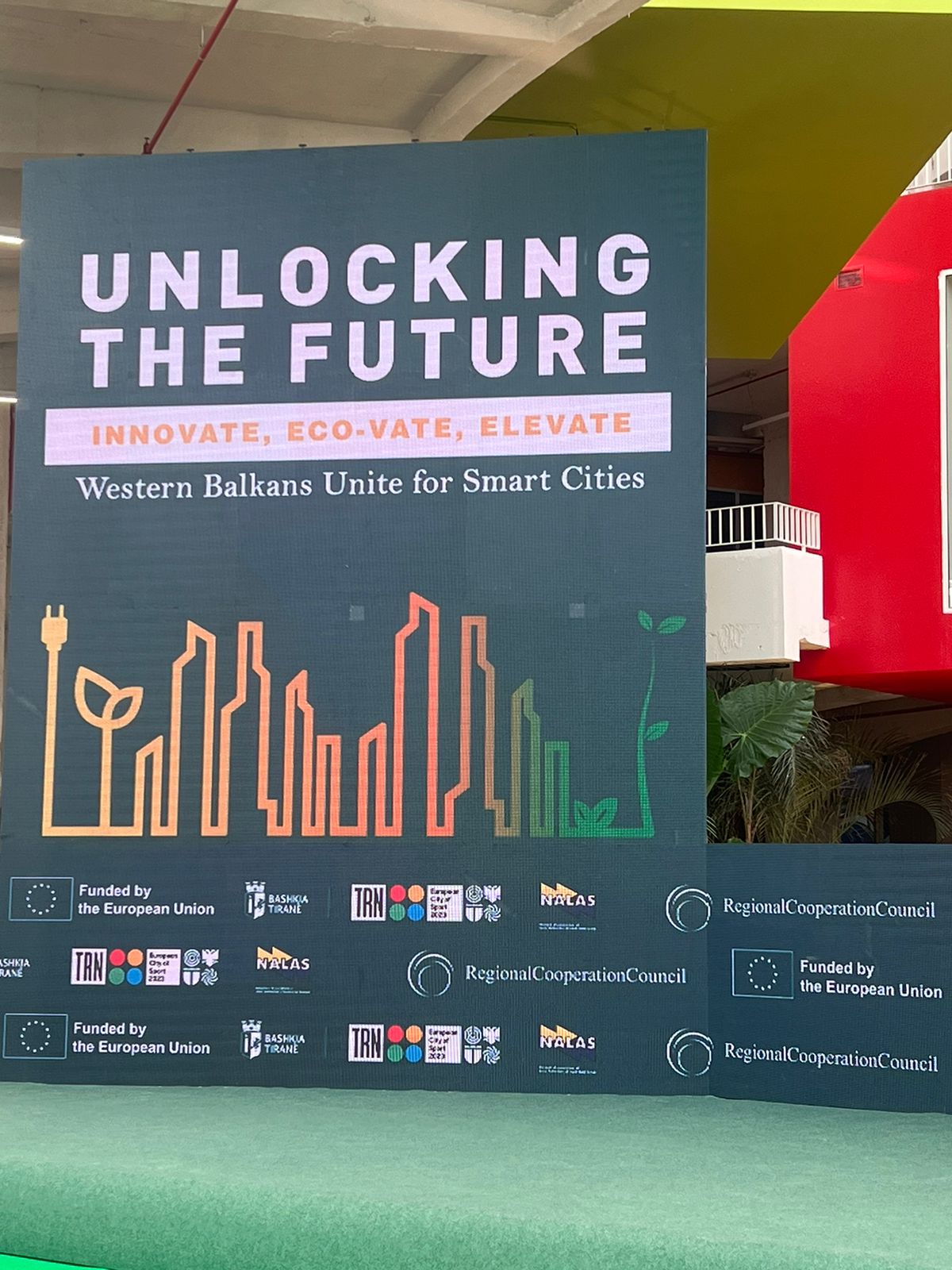Cities for Green Agenda
The inaugural Local Self-Governments Forum “Unlocking the Future: Innovate, Eco-vate, Elevate – Western Balkans Unite for Smart Cities,” held on October 12, 2023 in Tirana, marked a significant step in advancing the Green Agenda for the Western Balkans at the local level. This forum, organized by the Regional Cooperation Council (RCC) in collaboration with the Municipality of Tirana and the Network of Association of Local Authorities of South East Europe (NALAS), set the stage for the structured regional dialogue between Local Self-Governments from the Western Balkans. The Regional Advocacy Network was invited to attend and contribute to the forum.
Cities as Drivers of Innovations

“Today, some 56% of the world’s population – 4.4 billion inhabitants – live in cities.”[1]However, this rapid urbanization brings substantial governance and capacity challenges. Yet, cities are becoming incubators of change and drivers of innovation. Addressing pressing environmental issues, from air pollution to waste management, demands a substantial change in the urban infrastructure, transportation systems, and energy sources, often complex and costly.
In this context, Majlinda Bregu, RCC Secretary General, emphasized the need to support cities and regions in accelerating their transitions towards environmentally friendly and digitally advanced urban environments.
Cities the Source of Emissions and Solutions
Cities account for over 70% of global CO2 emissions. [2]Paradoxically, they also hold the potential to generate solutions. “Building cities that “work” – green, resilient, and inclusive– requires intensive policy coordination and investment choices. National and local governments have an important role to play to act now, to shape the future of their development, and to create opportunities for all.” [3]
Cities have the power to connect cultures and peoples. Collaboration across borders becomes essential as solutions developed in one city can often be replicated in others, stressed Arbjan Mazniku, Minister for Local Government, Albania.
Mathieu Mori, Secretary General, Congress of Local and Regional Authorities of the Council of Europe (CoE), highlighted the key role of local and regional governments in addressing climate change. two-thirds of the measures to mitigate climate change will be implemented at the local level. This task gives Mayors, Governors, and President of Regions a historic responsibility. Yet, to meet this challenge, cities and regions must embrace decentralization and local democracy.

Green Transformation of Cities Across the Region
Climate change has its most pronounced impact on local communities and people, making the role of cities in environmental change vital. The success of the Green Agenda relies on empowering local authorities and providing the necessary support for the investments essential to meet citizens’ needs, as noted by Ambassador Luigi Soreca.
Innovative Solutions in Three Balkan Cities
The rapid growth of Pristina in recent years brought forth a lot of challenges stemming from inadequate public investments. Traffic congestion, waste management problems, and infrastructure deficiencies like roads and schools became commonplace. In response, the local government embraced a holistic approach, envisioning a polycentric city. They widened the main boulevard, constructed an outer ring road, developed underground car parking facilities, introduced 30 new buses, and initiated campaigns to change citizens’ travel behaviors. These transformational efforts have resulted in approximately 75% of residents connecting conveniently with the pedestrian boulevard.
Montenegro, known for its ecological constitution, embarked on a journey to reduce CO2 emissions and promote solar energy, particularly in Podgorica. Despite this green focus, the city faced a significant challenge, with 75% of commuters relying heavily on cars and taxis, leading to traffic gridlocks and increased carbon emissions. To tackle this, the local government introduced a unique incentive – free bus rides for students from elementary to high school until the end of the year. This move not only encouraged families to choose buses for school commutes but was extended to one month of free bus rides for all city residents. This approach led to a remarkable surge in public transportation usage, prompting the city to expand its fleet with the purchase of 50 additional buses and exploring pedestrian-friendly urban planning.
In a creative and cost-effective move, Tirana initially tackled its transportation and pollution issues by introducing electric buses. However, the expenses associated with electric buses posed a challenge. To significantly enhance the city’s electric vehicle presence without incurring substantial costs, the local government implemented a regulatory change. This change streamlined the licensing process for electric taxis, enabling them to obtain licenses within a mere 24 hours. These innovative measures illustrate how the city made substantial improvements without a substantial financial burden.
Green Initiatives in Western Balkans
Across the Western Balkans, capital cities are leading transformative green initiatives that address a range of environmental challenges. Here’s a glimpse of the innovative projects making these cities more sustainable and eco-friendly:
- Tirana: The Orbital Forest project, which aims to plant two million trees, is increasing urban greenery and creating a natural boundary to combat urban sprawl.
- Sarajevo: The city is implementing energy-efficient solutions and upgrading lighting to reduce emissions equivalent to removing one thousand cars from the streets.
- Pristina: The city is upgrading its buildings for energy efficiency, resulting in energy savings and reduced CO2 emissions.
- Podgorica: The city’s “Two Wheels” initiative promotes environmentally friendly and alternative transportation modes.
- Skopje: The Bus Rapid Transit project aiming to cut CO2 emissions up to forty-two percent, utilizing Compressed Natural Gas buses.
- Belgrade: With its one-hundred-three MW waste-to-energy facility is contributing to the reduction of CO2 emissions and decreasing its dependence on fossil fuels.
However, the success of these initiatives depends on strong support from policymakers. As Majlinda Bregu emphasizes, these solutions must be aligned with the EU-wide solutions on green and energy transition to ensure that they meet the criteria of being smart, clean, green, and inclusive.
[1]https://www.worldbank.org/en/topic/urbandevelopment/overview#:~:text=Today%2C%20some%2056%25%20of%20the,people%20will%20live%20in%20cities.
[2] https://blogs.worldbank.org/sustainablecities/cutting-global-carbon-emissions-where-do-cities-stand
[3]https://www.worldbank.org/en/topic/urbandevelopment/overview#:~:text=Today%2C%20some%2056%25%20of%20the,people%20will%20live%20in%20cities.




